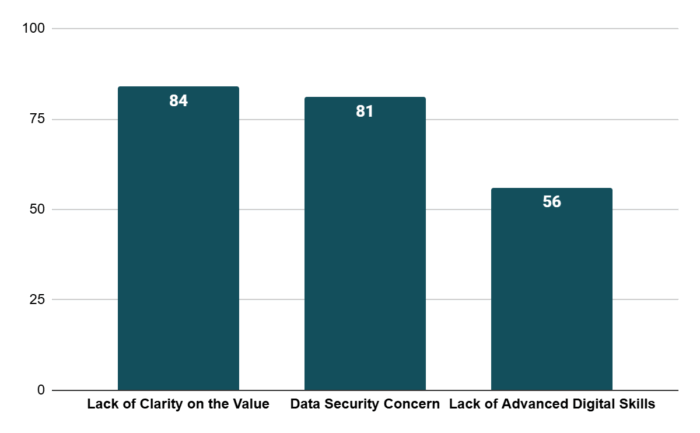Upskilling Beyond Technology: A Necessity for MSMEs Across Every Function
- MSMEs in India employ 26 crore individuals, which comprises nearly 44% of the total workforce, but most MSMEs find it difficult to scale as they lack highly skilled employees.
- Merely 15% of MSMEs have adopted tech tools, including AI, or analytics tools that would potentially improve any areas.
- This indicates that MSMEs need to realise the importance of upskilling, test its impact and then implement it across all their functions to scale effectively.
MSMEs in India employ approximately 26 crore individuals or nearly 44% of the total 58.2% Worker Population Ratio (WPR)1. However, despite the robust number, a significant portion remains under-skilled or entirely unskilled, often resulting in stagnating productivity, inefficient operations, and limited growth opportunities. Among the most common reasons for a lack of skills is the myth in Tier 2 and Tier 3 cities that upskilling is only relevant to large enterprises or technology companies. Additionally, for many small business owners, upskilling remains synonymous with operating new machines or learning advanced software. Contrary to this belief, upskilling goes beyond technical certifications or software know-how. It involves building capabilities across three broad areas: operational, managerial, and strategic. This can range from understanding how to digitally track inventory or use GST-compliant billing software to learning how to negotiate better deals with suppliers or manage a growing team.
This blog article aims to unpack the real meaning of upskilling for MSMEs, explain its urgency across sectors, and outline how it can act as a catalyst for holistic growth.
What Does Upskilling Really Mean for MSMEs?
With customer needs changing at a rapid pace, new rules being introduced often, and many businesses using digital tools; MSMEs are expected to work smarter and grow stronger. But upskilling doesn’t just mean learning how to use a new machine or a software tool. It also includes improving how a business is run—from keeping records and handling money, to managing teams and dealing with customers.
For example, learning how to use WhatsApp Business or billing apps is useful—but so is learning how to explain your product better to a customer, manage your workers more effectively, or plan for the next six months. Many MSMEs are often faced with choosing between learning Excel or focusing on improving staff in soft skills like interacting with customers; or between buying new machinery or training the workers to use what they already have better.
Upskilling is not about prioritizing one over the other. Each business must decide what kind of skills are most needed at a given time—whether it’s technical know-how or better team management. The goal is to grow steadily and make the business stronger in every way.
Understanding the Gaps in Awareness and Access
Even if the importance of upskilling is clear, actually getting started remains a major hurdle for many MSMEs. While some are open to learning, they often face confusion about where to begin, what kind of training is relevant, and how to fit it into their day-to-day business routines.
This lack of clarity is made worse by:
- Too many course options with no clear guidance
- Uncertainty about costs and outcomes
- Limited time for structured learning
- Fear of complexity or feeling left behind
- Poor awareness of available support or government schemes
Owing to the above factors, 61% of MSMEs stated that government skill and talent initiatives had not reached them and 71% of small firms believe government-run skill-training programs haven’t helped them.2 This gap was particularly wide among manufacturing-focused MSMEs, which form a large part of India’s job-creating enterprises, and highlights a major gap in outreach and relevance.
Without clear access, trusted platforms, or local success stories to learn from, many MSMEs continue to rely on informal methods—trial and error, word of mouth, or copying what peers are doing.
As a result, most skill adoption is superficial, inconsistent, and often limited to basic tools or informal knowledge. This reflects clearly in national-level findings. Only 15% of MSMEs have adopted any form of artificial intelligence or analytics3. Even among those who use digital tools, most continue to rely on basic solutions, such as spreadsheets or standalone billing apps.
While nearly two-thirds of MSMEs report using tools such as CRM (Customer Relationship Management) or ERP (Enterprise Resource Planning), their use is often limited to a few functions due to fears of cybersecurity concerns or skill gaps4. These issues make it difficult for MSMEs to build long-term skills that can improve operations, reduce costs, or open up new markets. Here are the barriers to the adoption of skills in MSMEs:

Source: CyberMedia Research Report, June 2025
Skills required by MSMEs
While tech skills, like machines, tools, and software, get most of the attention, business success often hinges on how decisions are made, how teams are managed, and how markets are approached. Some of them include:
- Communication & Negotiation: Crucial for supplier deals, client pitches, and vendor management.
- Sales & Pitching: Especially important for B2B partnerships, investor presentations, or government contracts.
- Financial Literacy: Basic understanding of cash flows, working capital, GST filings, business loans, and bank interactions.
- Leadership & Delegation: Many owners do everything themselves, but as teams grow, delegation becomes essential.
- Digital Engagement: Social media and communication platforms such as WhatsApp, Facebook, and others play a growing role in shaping how customers perceive a brand and interact with small businesses.
To overcome the above-mentioned barriers, focusing on the following non-technical and technical skills would help MSMEs to a great extent:
Non-Technical & Business Management Skills such as:
- Budgeting: Understanding how to allocate costs across operations, plan expenses, and maintain financial discipline.
- Loan Awareness and Management: Knowing when to opt for formal credit, choosing the RBI-registered NBFC or bank, and managing repayments effectively to maintain credit health.
- Stronger team communication and role clarity to improve productivity
- Pitching, branding, and storytelling—helping businesses stand out in crowded markets
- Succession planning and long-term thinking to ensure continuity across generations or during transitions
Technical & Digital Skills include:
- Using tools like ERP, CRM, and billing system software for smoother operations
- Adopting modern payment infrastructure such as UPI, QR-based payments, and POS devices to improve transaction ease
- Basics of digital marketing, including SEO, content, and social media outreach
- Familiarity with AI-based tools, like automated messaging or translation for cross-border sales
- Supply chain digitization for better tracking, planning, and vendor coordination
- Lean manufacturing and quality control techniques to reduce waste and improve consistency
- Accounting software for maintaining digital books, GST compliance, and financial reporting
- Inventory management to ensure stock levels meet unexpected demand surges while minimizing excess and wastage
These are not theoretical ideas but practical skills that directly affect a business’s ability to withstand shocks, secure funding, and grow sustainably. Prioritizing both types of learning ensures MSMEs don’t just survive, but scale with confidence. Key action items for MSMEs include:
- Discovery Platforms: MSMEs need centralized, easy-to-navigate portals where verified courses are clearly listed based on sector, job role, and business objective. Platforms like Skill India Digital and the MSME Champions portal are steps in the right direction, but regional customization and stronger promotion are essential for greater reach.
- Strategic Thinking: Skilling should no longer be treated as a one-time fix or emergency measure. Just like sourcing raw material or paying salaries, it must be built into the business plan, with time and budgets allocated accordingly.
- Local Delivery Partners: Tie-ups between MSME clusters, local vocational institutes, and edtech platforms can help bridge the last-mile gap. Delivering hybrid, bilingual programs with hands-on relevance can drastically improve outcomes—especially in Tier 2 and Tier 3 cities.
Upskilling is a gateway to expansion, better margins, and newer markets. Once equipped with the right skills (technical, managerial, and strategic), an MSME is ready to pursue growth through investments, digital transformation, and larger supply chain participation.
This is where timely access to credit and capital becomes essential. Financial institutions, especially RBI-registered NBFCs like Protium, are increasingly focusing on empowering MSMEs that show clear intent and capability to scale. Flexible products tailored for digital tools, equipment purchase, or working capital play a crucial role in enabling post-upskilling business transformation.
Ultimately, the journey from survival to sustainability for Indian MSMEs is not just about machines and money but about mindset and mastery, which starts with upskilling.

